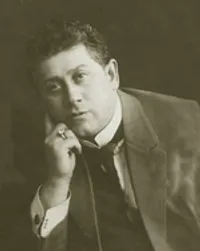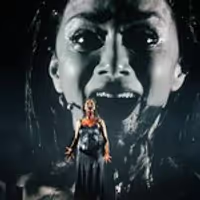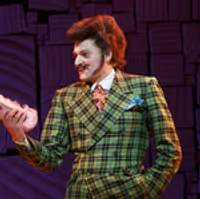LEMPICKA Reviews
MemorableUserName
Broadway Legend Joined: 3/27/19
#25LEMPICKA Reviews
Posted: 4/14/24 at 11:01pm
NYT:
Review: It’s No Sunday in the Park With ‘Lempicka’
A musical about the groundbreaking Art Deco painter is vocally thrilling but historically a blur.
https://www.nytimes.com/2024/04/14/theater/lempicka-review-chavkin-espinosa.html
"Because yes, another reason the show is a “monster” is that it’s a jolly big sing, with superior belting from several excellent practitioners of the craft. As Lempicka, Eden Espinosa blows thrillingly through nearly a dozen songs by Matt Gould (music) and Carson Kreitzer (lyrics). She has excellent company in Amber Iman as Lempicka’s lover Rafaela and Beth Leavel as a dying baroness who sits for a portrait. For good measure, Natalie Joy Johnson, as the cabaret star Suzy Solidor, contributes a barnburner to herald the opening of her lesbian hangout. Naturally the song is called “Women” — and it’s a nice change that a musical about them gives them pride of place.
But if there’s no denying the realness of the vocal power, and the sleekness of Rachel Chavkin’s staging on deconstructed Art Deco sets by Riccardo Hernández, the story (by Kreitzer and Gould) too often feels incredible in the wrong sense of the word. It’s not just that Marinetti (George Abud, excellent) is so weirdly central, or that Rafaela is a composite, or that in real life Solidor was a Nazi collaborator and Lempicka the baroness’s betrayer, not her portraitist. (Lempicka began her affair with the baron, played by Nathaniel Stampley, years before he was widowed.) It’s that the condensing, rejiggering and flat-out fudging of the plot create a contextual blur that obscures the main character."
...
"That there is little if any historical truth in that characterization is not ultimately the problem. The painter Georges Seurat in “Sunday in the Park With George” — a show referenced in the first lines of the script — is largely fictionalized too, a cad to his mistress and generally unlikable. “Lempicka” doesn’t have the craft, especially in the mis-accented, often vague lyrics, to make its title character a relatable modern woman, nor the boldness to let her be awful and great. Perhaps if it were less of a machine she could be more of a monster."
MemorableUserName
Broadway Legend Joined: 3/27/19
#26LEMPICKA Reviews
Posted: 4/14/24 at 11:02pm
TimeOut:
https://www.timeout.com/newyork/theater/lempicka-broadway-musical-review
"
The result is a musical that sometimes embraces campiness and sometimes falls flat into camp, especially when it skirts melodrama: When kohl-eyed chorus boys, repurposed as brownshirts, violently raid Solidor’s queer bar—and then the show cuts to a wild-eyed Beth Leavel belting “It’s the end of time!!” straight at the audience—I challenge you not to giggle. And where in time are we supposed to be, exactly? By this point in the show, Lempicka seems to have abandoned history entirely: Why is the futurist Italian painter Filippo Marinetti (an emphatic George Abud) leading what appears to be a police raid in Paris in the 1930s? It doesn’t help that another musical in town right now, Cabaret, depicts queerness and fascism with a great deal more depth.
At the end of the show, when some of Lempicka’s works descend from the ceiling, they seem to reveal more about the artist than we’ve seen all night. They have what the musical lacks: a clear and compelling aesthetic. "
MemorableUserName
Broadway Legend Joined: 3/27/19
#27LEMPICKA Reviews
Posted: 4/14/24 at 11:03pm
Chicago Tribune:
Review: ‘Lempicka’ struggles to make a painter’s life work as a Broadway musical
https://www.chicagotribune.com/2024/04/14/review-lempicka-struggles-to-make-a-painters-life-work-as-a-broadway-musical/
"Indeed, a perceived need to glob on enough sexy-modern Broadway pizzazz to appeal to a broader public might well be what torpedoed “Lempicka,” now at the Longacre Theatre. This potentially appealing show would have sat more easily as a feminist, non-musical drama in a less pressured space, where the director, Rachel Chavkin, and the performers, all too aware of their need to liven up this clunky bio-musical, did not have to push so darn hard.
These are among the most overwrought and uncentered performances of the Broadway musical season so far, even though they come from some of the most talented actors. Much the same could be said for Raja Feather Kelly’s choreography, which sexes the story up like we were all out clubbing with de Lempicka in some timeless bacchanal but struggles to find a vocabulary rooted in place or theme."
MemorableUserName
Broadway Legend Joined: 3/27/19
#28LEMPICKA Reviews
Posted: 4/14/24 at 11:04pm
Deadline:
https://deadline.com/feature/broadway-show-reviews-spring-2024-1235866317/
"Actually, the musical doesn’t so much follow the artist as latches on for a ride that’s both thrilling and tiring. Directed by the ever-inventive Rachel Chavkin, with a powerhouse Eden Espinosa (Wicked) in the title role, Lempicka offers up a tempting mix of retro-futurism and just plain retro, with choreography (by Raja Feather Kelly), scenic design (Riccardo Hernández) and costumes (Paloma Young) that work hard to convey the Zelig-like scope of the artist’s life. That means we see, along with some sumptuous Deco-heavy visuals, lots of energetic dancing that frequently cribs from the most arresting of “Vogue”-era Madonna (fair is fair: Blond Ambition was a Lempicka painting come to life). At its worst, though, the dancing leads the musical through some very cartoony presentations of Soviet Realism and Left Bank bohemianism.
Though the musical’s book and lyrics remain doggedly by-the-numbers, Chavkin’s direction (and a good cast that includes Andrew Samonsky, Amber Iman, George Abud, Beth Leavel and Natalie Joy Johnson) keeps Lempicka barreling through the last century’s wartime horrors, peacetime optimism and an art that grew from both."
#29LEMPICKA Reviews
Posted: 4/14/24 at 11:05pm
Somebody hide the fine dinnerware. Gonna be some tempers tonight.
MemorableUserName
Broadway Legend Joined: 3/27/19
#30LEMPICKA Reviews
Posted: 4/14/24 at 11:06pm
Slant:
Lempicka Review: A Tonally Jumbled Celebration of the Undervalued “Baroness with a Brush”
It never stands a chance of being so bad it’s good because it wants to be good so badly.
https://www.slantmagazine.com/theater/lempicka-broadway-review/
#31LEMPICKA Reviews
Posted: 4/14/24 at 11:07pm
Lempicka’ is ambitious but clunky bio-musical about little-known artist
https://www.nydailynews.com/2024/04/14/broadway-review-lempicka-is-ambitious-but-clunky-bio-musical-about-little-known-artist/
MemorableUserName
Broadway Legend Joined: 3/27/19
#33LEMPICKA Reviews
Posted: 4/14/24 at 11:08pm
The Wrap:
‘Lempicka’ Broadway Review: Lesbians Get Their Big Musical Moment, Finally
The Art Deco artist named Tamara de Lempicka headlines a new show that’s at its best when she’s off the stage
https://www.thewrap.com/lempicka-broadway-review-lesbians-get-their-big-musical-moment-finally/
MemorableUserName
Broadway Legend Joined: 3/27/19
#34LEMPICKA Reviews
Posted: 4/14/24 at 11:10pm
Theatermania:
Review: Lempicka on Broadway Pays Tribute to a Great But Unknown Artist
Eden Espinosa stars in the title role.
https://www.theatermania.com/news/review-lempicka-on-broadway-pays-tribute-to-a-great-but-unknown-artist_1737182/
"Regretfully, Paloma Young’s costumes were unsuccessful, too. She pairs period clothes for the lead characters with an ensemble clad in sexy Madonna-does-Lempicka outfits (bustier jumpsuits, corsets tucked into pants, sleeveless muscle shirts, eyeliner, finger waves). The ensemble presents problems for pretty much everyone. Raja Feather Kelly’s choreography for them was confused and disjointed, spanning ballroom partner dance and elegant dips to jerky, TikTok-esque arm movements.
However, the performances from Espinosa and the other principals are so exceptional that they more than make up for it. Espinosa confidently carries this show with the swagger of her character. Her performance spans almost 60 years of Lempicka’s life, and she transforms with admirable ease through her life’s many chapters: demure bride who dabbles in painting, struggling young wife and mother, eager aspiring artist, famed celebrity, forgotten old woman painting in a park. (Score-wise, at times, the incessant belting demanded of Espinosa can feel a bit much.)"
MadsonMelo
Broadway Legend Joined: 3/24/14
#35LEMPICKA Reviews
Posted: 4/14/24 at 11:10pm
Those are some of the worst reviews of the season. The Tony nom is out of question, I guess and the grosses are really bad. I, sadly, sense a ''KPOP'' situation if they don't have enough money.
PipingHotPiccolo
Broadway Legend Joined: 6/13/22
#36LEMPICKA Reviews
Posted: 4/14/24 at 11:11pm
Jordan Catalano said: "These are worse than I thought they’d be."
yes, much harsher than i anticipated, and thats fine, but its kinda odd how focused they all seem to be on pointing out the historical inaccuracies. as if other historical dramas stick only to proven fact? seems like a silly complaint.
but also seems like lempicka is not long for this world if reviews still matter (unclear if thats the case)
MemorableUserName
Broadway Legend Joined: 3/27/19
#37LEMPICKA Reviews
Posted: 4/14/24 at 11:15pm
Washington Post:
An artist with a big, messy life gets a big, messy musical
On Broadway, ‘Lempicka’ resurrects Madonna’s favorite Polish art deco master as a contemporary icon of liberation
https://www.washingtonpost.com/entertainment/theater/2024/04/14/lempicka-broadway-review/
"In “Lempicka,” history is, as they say, just one dance number after another. It summons the shocks and jolts that forge the identity and resiliency of the artist, which doesn’t yield an actual character, but more of a ready-made hero for contemporary political tastes. Espinosa does heroic work tying the threads together, but instead of inhabiting a character with multiple facets, she’s left to reconcile multiple characters serving various theatrical purposes."
#38LEMPICKA Reviews
Posted: 4/14/24 at 11:16pm
Audibly gasped at that Washington Post headline.
#39LEMPICKA Reviews
Posted: 4/14/24 at 11:17pm
This site is characterizing the Green review as mixed? Has everyone with access read it? It’s a pan with a few nods to a handful of disparate elements.
#40LEMPICKA Reviews
Posted: 4/14/24 at 11:17pm
If it had launched in the fall, it might have limped along to a run like Ohio or Harmony. But this spring, it'll be lucky to make it until Tony noms and it definitely won't make it much past that when it likely gets zero nominations (unless Espinosa can somehow snag one). Sad for those involved but this was clearly a miss.
#41LEMPICKA Reviews
Posted: 4/14/24 at 11:19pm
Auggie27 said: "This site is characterizing the Green review as mixed? Has everyone with access read it? It’s a pan with a few nods to a handful of disparate elements."
Yeah, there’s no way that’s mixed. Unless this site is trying to make the show happy, that needs to be changed to a thumbs down.
#42LEMPICKA Reviews
Posted: 4/14/24 at 11:20pm
I can see all these new musical ticket buyers running away from these middling musicals and willingly paying Cabaret ransom prices for quality over quantity.
MemorableUserName
Broadway Legend Joined: 3/27/19
#43LEMPICKA Reviews
Posted: 4/14/24 at 11:21pm
1 star from NY Post
‘Lempicka’ Broadway review: Painter musical is an epic wreck
https://nypost.com/2024/04/14/entertainment/lempicka-broadway-review-painter-musical-is-an-epic-wreck/
PipingHotPiccolo
Broadway Legend Joined: 6/13/22
#45LEMPICKA Reviews
Posted: 4/14/24 at 11:23pm
id still be surprised if the cast is forgotten come awards season, these reviews for the cast still seem plenty strong.
MemorableUserName
Broadway Legend Joined: 3/27/19
#46LEMPICKA Reviews
Posted: 4/14/24 at 11:24pm
Queerty:
Madonna’s muse steps into the spotlight
https://www.queerty.com/madonnas-muse-lempicka-steps-into-the-spotlight-20240414
"“Why were they voguing?” my companion asks at intermission, referring to a dance sequence early in the show. “Ah, that makes sense,” she responds with a slightly perplexed look after I explain the Madonna connection. Herein lies Lempicka’s challenge: the musical wants to capitalize on Madonna and other pop stars’ notoriety along with sense of agency uncommon to female artists of the era, but its creators have stretched the canvas so thin that the brush strokes crack. "
MemorableUserName
Broadway Legend Joined: 3/27/19
#47LEMPICKA Reviews
Posted: 4/14/24 at 11:27pm
NY Sun:
A New Broadway Musical, ‘Lempicka,’ Offers Opportunity To Get To Know an Art Deco Icon
The titular artist, Tamara de Lempicka, is cursed to live in interesting times, fleeing both revolutionary Russia and Hitler-era Europe, and is burdened with the additional challenges of being a woman, and bisexual.
https://www.nysun.com/article/a-new-broadway-musical-lempicka-offers-opportunity-to-get-to-know-an-art-deco-icon
"As Tamara, Eden Espinosa gets to once again use the siren-like belt and the mix of might and vulnerability she deployed during several stints as Elphaba in “Wicked” — this time while sporting a platinum-blonde bob that makes her look like 1990s-era Madonna (a noted Lempicka fan, naturally). Granted, the vocal showcases she is provided by composer Matt Gould and lyricist Carson Kreitzer — who collaborated on the book, based on Ms. Kreitzer’s concept — are seldom as tuneful as they are flamboyant. "
#48LEMPICKA Reviews
Posted: 4/14/24 at 11:28pm
PipingHotPiccolo said: "id still be surprised if the cast is forgotten come awards season, these reviews for the cast still seem plenty strong."
Casts from panned shows only get a nomination when the competition is light. Even with mixed reviews for other shows, they're way better than Lempicka and there's so many shows and so much competition, it's not gonna happen. Remember when people thought Carolee Carmello might get a nomination for Bad Cinderella last year?
#49LEMPICKA Reviews
Posted: 4/14/24 at 11:47pm
What time does the “This show deserves to be SEEN!” effort begin tomorrow?
Videos






